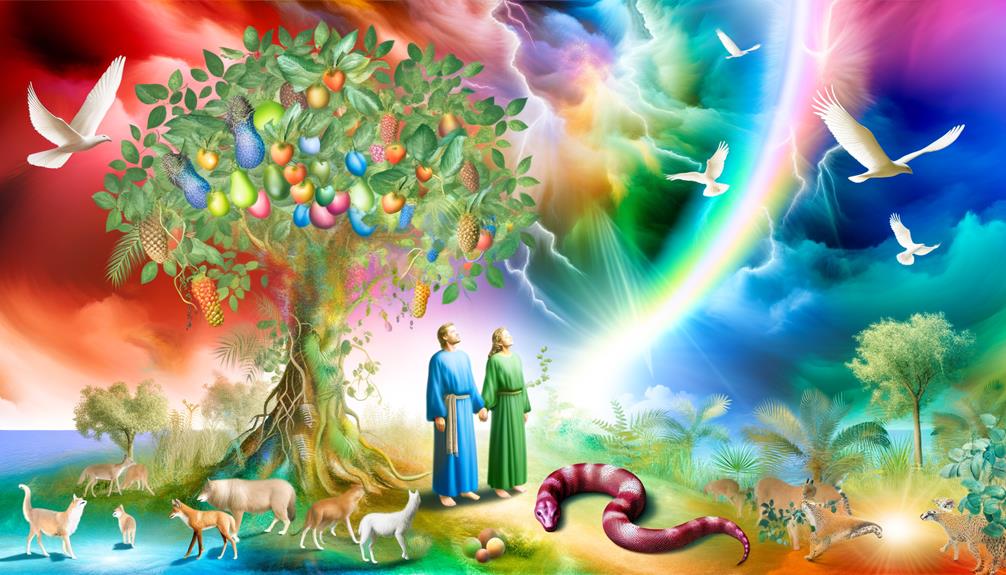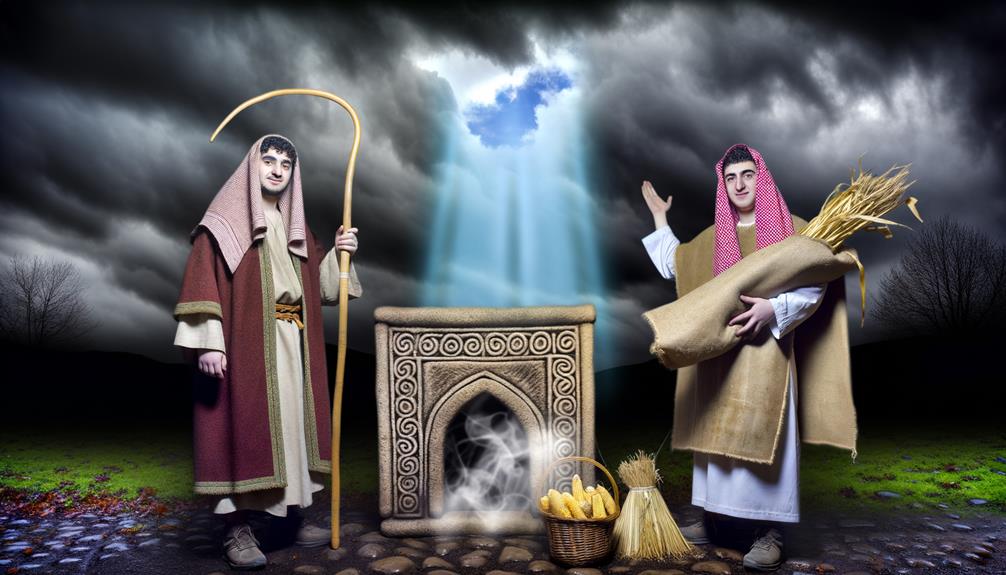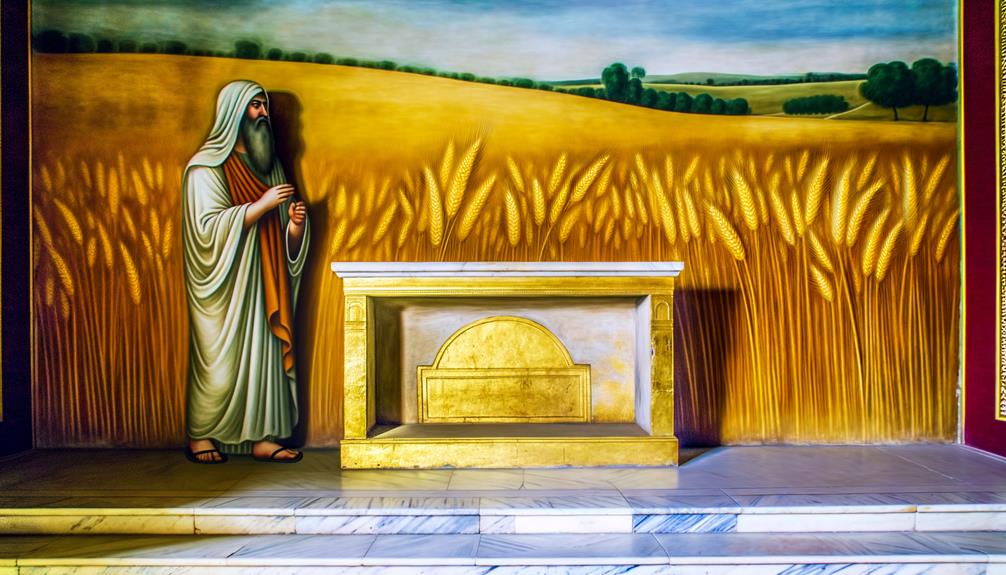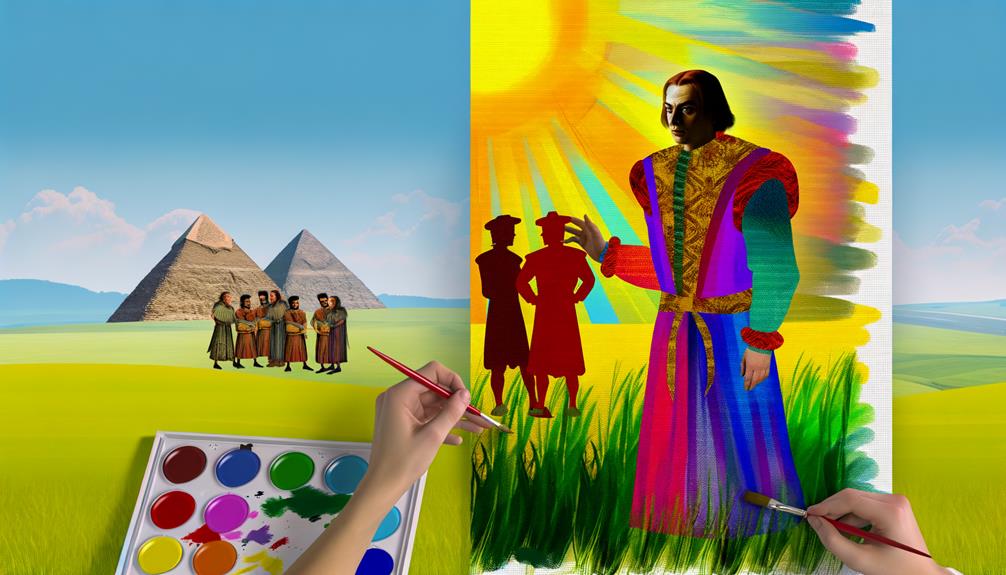Meaning of the Book of Genesis in the Bible: Creation
The Book of Genesis, the first book of the Bible, serves as a theological cornerstone detailing the creation of the world, the beginnings of humanity, and God’s early covenants. It introduces key themes such as divine omnipotence, human free will, and the interplay of sin and redemption.
From the creation narrative and the story of Adam and Eve to the Flood and the covenant with Abraham, Genesis lays the foundation for understanding God’s relationship with humanity. Through its pivotal stories, Genesis frames essential doctrines of sin, justice, and divine promise, urging deeper exploration of these foundational principles.

Meaning of the Book of Genesis in the Bible: Creation, Covenant, and Foundations of Faith
| Aspect | Details |
|---|---|
| Book Overview | First book of the Bible; provides the foundation of God’s creation, humanity’s origins, and His covenant with His people. |
| Key Themes | Creation of the world, fall of humanity, God’s covenant with patriarchs, and the beginnings of redemption. |
| Main Characters | Adam and Eve, Noah, Abraham, Sarah, Isaac, Jacob, Joseph, and God. |
| Key Events | Creation of the world, fall in the Garden of Eden, Noah’s flood, Abraham’s covenant, Isaac’s birth, Jacob’s transformation, and Joseph’s rise in Egypt. |
| Symbolism | Creation: God’s power and order; Tree of Life: Eternal life and choice; Ark: Salvation and faith; Covenants: God’s promises and faithfulness. |
| Historical Context | Traditionally attributed to Moses, written around 1400–1200 BCE. Reflects the early beliefs and origins of the Israelite faith. |
| Purpose of the Book | To reveal God as the Creator, establish the covenant relationship, and explain the origins of humanity and sin. |
| Lessons for Today | Teaches about humanity’s purpose, the consequences of sin, and the importance of trusting in God’s promises and plans. |
Creation Narrative

The Creation Narrative in the Book of Genesis, frequently regarded as a foundational theological text, outlines a divinely orchestrated process of bringing the universe into existence.
This narrative, spread across the initial chapters of Genesis, serves as a theological assertion of divine omnipotence and intentionality.
The structured sequence, spanning six days of creative acts followed by a day of rest, highlights an ordered cosmos emerging from chaos.
Each phase, from the separation of light from darkness to the creation of celestial bodies, vegetation, and living creatures, underscores the distinctiveness and purpose imbued in creation.
The narrative is not merely cosmological but deeply theological, emphasizing God’s sovereignty and the inherent goodness of the created order, setting the stage for subsequent theological discourses.
Adam and Eve

Examining the narrative of Adam and Eve reveals profound theological insights into human origins, relationships, and the nature of sin.
The account, found in Genesis 2-3, portrays Adam as the first man created from the dust and Eve as the first woman formed from Adam’s rib, symbolizing intimate human connectedness.
Theologically, this union underscores the sanctity of marriage and mutual dependence.
Their existence in the Garden of Eden represents an ideal state of harmony with God and creation.
Additionally, the instruction given to them about the Tree of Knowledge highlights the significance of human free will and moral responsibility.
Consequently, Adam and Eve are pivotal in understanding humanity’s intended relationship with the divine and each other.
The Fall of Man

The Fall of Man encapsulates the pivotal moment of humanity’s initial temptation and subsequent disobedience, which sets the stage for an examination of the consequences of sin within the broader narrative of Genesis.
This event not only underscores the moral and spiritual ramifications for Adam and Eve but also introduces the enduring theme of a promised redemption.
Consequently, the theological implications of this transgression extend beyond immediate punishment, hinting at a future reconciliation between humanity and the divine.
Temptation and Disobedience
Genesis’ narrative of the Fall of Man centers around the themes of temptation and disobedience, intricately depicting humanity’s initial breach of divine command. This pivotal story unfolds in the Garden of Eden, where Adam and Eve encounter the serpent and subsequently succumb to temptation.
Key elements in this narrative include:
- The Serpent’s Deception: The serpent, embodying cunning and deceit, persuades Eve to eat the forbidden fruit, questioning God’s command and suggesting the fruit grants divine wisdom.
- Eve’s Choice: Faced with the allure of knowledge, Eve eats the fruit and offers it to Adam, illustrating the human susceptibility to temptation.
- Divine Command Breached: Adam and Eve’s actions represent a deliberate act of disobedience, marking humanity’s departure from divine will.
This narrative provides profound insights into theological concepts of free will and moral responsibility.
Consequences of Sin
Humanity’s initial transgression in the Garden of Eden precipitates a cascade of profound consequences, fundamentally altering the relationship between the divine and human domains.
Theologically, this act of disobedience introduces sin into the world, severing the intimate communion between God and humanity.
Contextually, the immediate ramifications include the expulsion from Eden, symbolizing a loss of innocence and the onset of human suffering, labor, and mortality.
Furthermore, the serpent’s deception and Eve’s subsequent action highlight the complexities of free will and moral responsibility.
Analytically, the narrative underscores the gravity of sin, emphasizing its pervasive impact on human existence and the inherent need for divine justice and mercy, thereby setting the stage for the broader biblical narrative.
Promise of Redemption
In the wake of humanity’s fall, the narrative of Genesis immediately introduces the promise of redemption as a counterbalance to the consequences of sin. This theme is woven into the fabric of the text, underscoring divine grace and mercy.
Key elements of this promise include:
- Protoevangelium: Genesis 3:15 prophesies the eventual triumph over evil through the ‘seed of the woman,’ a foretelling of Christ’s redemptive work.
- Covenantal Promises: God’s covenant with Abraham (Genesis 12:1-3) signifies the unfolding of a divine plan to bless all nations through his lineage.
- Symbolism of Sacrifice: The provision of animal skins for Adam and Eve (Genesis 3:21) symbolizes the necessity of atonement and prefigures sacrificial systems pointing to ultimate redemption.
These elements frame the theological understanding of redemption in Genesis.
Cain and Abel

The narrative of Cain and Abel introduces the profound themes of sibling rivalry and divine justice in the Book of Genesis.
This story not only reflects the origins of human conflict but also illustrates the moral implications of jealousy and the consequences of actions in the eyes of God.
Sibling Rivalry Origins
Emerging from the early chapters of Genesis, the story of Cain and Abel serves as a profound theological and psychological exploration of sibling rivalry and the genesis of human conflict. This narrative investigates the complexities of human emotions and divine expectations, providing insight into the origins of familial discord.
Key elements include:
- Differing Offerings: Cain’s agricultural produce versus Abel’s animal sacrifice illustrate divergent paths of worship and divine favor.
- Divine Rejection and Anger: God’s preference for Abel’s offering incites Cain’s anger and jealousy, illuminating the destructive potential of unaddressed emotions.
- The First Murder: Cain’s act of violence against Abel marks the inception of physical conflict, symbolizing the extreme outcomes of unresolved sibling rivalry.
Through these elements, the text invites a deeper reflection on human relationships and ethical conduct.
Divine Justice Explored
Exploring the narrative of Cain and Abel reveals profound insights into the nature of divine justice and its implications for human ethical behavior. The story, found in Genesis 4, depicts the first act of fratricide, initiated by Cain’s jealousy over God’s favoring of Abel’s offering.
Theologically, this account underscores divine justice as both retributive and instructive. Cain’s punishment—exile and a mark of protection—illustrates a justice that balances retribution with mercy, preventing further violence.
Contextually, it serves as a moral lesson on the perils of unchecked envy and the importance of righteous intentions. This narrative invites readers to reflect on the broader themes of accountability, the sanctity of life, and the complex interplay between divine judgment and human free will.
Noah and the Flood

Amidst the broader narrative of Genesis, the account of Noah and the Flood serves as a pivotal theological discourse on divine judgment and mercy. This story encapsulates the consequences of human corruption and the grace extended to righteousness.
Theologically, it underscores three critical elements:
- Divine Judgment: The flood represents a thorough divine response to pervasive wickedness.
- Human Righteousness: Noah’s selection highlights the value placed on virtue and obedience amidst societal decay.
- Covenantal Promise: Post-flood, God’s covenant with Noah symbolizes a renewed commitment to creation, emphasizing hope and continuity.
This narrative not only reflects ancient Near Eastern flood traditions but also amplifies themes of moral accountability and divine compassion within the biblical framework.
Covenant With Abraham

The Covenant with Abraham encapsulates fundamental theological themes, including divine promises of progeny and land, the institution of circumcision as a perpetual sign, and the delineation of blessings and obligations.
This covenant not only shapes the narrative arc of Genesis but also establishes a framework for understanding God’s ongoing relationship with humanity.
Analyzing these aspects offers critical insights into the broader covenantal theology that permeates the Hebrew Scriptures.
Promises to Abraham
Central to the theological narrative of Genesis, the promises to Abraham, or the Abrahamic Covenant, serve as a foundational pillar in understanding God’s enduring commitment to establishing a chosen people. This covenant, detailed in Genesis 12, 15, and 17, encapsulates the divine assurances made to Abraham, which are pivotal for biblical theology and the unfolding of salvation history.
The promises to Abraham can be succinctly categorized into three primary elements:
- Land: God promises Abraham and his descendants a specific territory, often referred to as the Promised Land.
- Descendants: Abraham is assured that his progeny will be as numerous as the stars in the sky.
- Blessing: Through Abraham, all the families of the earth will find blessing.
These elements collectively underscore a divine strategy for redemption and community formation.
Significance of Circumcision
Circumcision, as mandated in Genesis 17, serves as a crucial physical sign of the Abrahamic Covenant, symbolizing the perpetual and tangible relationship between God and Abraham’s descendants.
Theologically, circumcision represents a profound act of faith and obedience, marking the chosen people set apart for divine purposes.
Contextually, it functions as a rite of passage, initiating males into the covenant community and affirming their identity within God’s promises.
Analytical perspectives highlight its role in unifying the Israelites under a common religious and cultural practice, reinforcing communal solidarity.
Consequently, circumcision is not merely a physical act but a deeply spiritual symbol, anchoring the covenantal bond that underscores the narrative of divine election and fidelity in the Book of Genesis.
Blessings and Obligations
Frequently underscored in theological discourse, the covenant with Abraham delineates both extraordinary blessings and significant obligations, establishing a foundational paradigm for understanding divine-human relationships in the Book of Genesis.
This covenant, as outlined in Genesis 12 and 15, is pivotal for its promise and reciprocal demands:
- Blessings: God promises Abraham numerous descendants, forming a great nation through which all families on earth shall be blessed (Genesis 12:2-3).
- Land: The grant of the land of Canaan as an everlasting possession to Abraham’s offspring (Genesis 15:18-21).
- Obligations: Abraham and his descendants are required to uphold God’s commandments and practice circumcision as a sign of their enduring commitment to the covenant (Genesis 17:1-14).
This duality of blessings and obligations underscores the mutual nature of divine covenants.
The Story of Isaac

The story of Isaac, a pivotal narrative within the Book of Genesis, explores themes of faith, covenant, and divine intervention, offering profound insights into the dynamics of God’s relationship with humanity.
Isaac’s birth to elderly parents, Abraham and Sarah, symbolizes divine promise and the miraculous.
The binding of Isaac (the Akedah) further emphasizes unwavering faith, as Abraham prepares to sacrifice his son, only to be stopped by God, reaffirming the covenant.
Isaac’s life, marked by his marriage to Rebekah and the birth of his sons, continues the lineage through which God’s promises manifest.
Theological reflections on Isaac underscore the interplay between human obedience and divine faithfulness, highlighting the enduring nature of God’s covenantal commitments. These reflections reveal how Isaac serves as a pivotal figure within the narrative of God’s promises, illustrating the profound relationship between trust in divine guidance and the fulfillment of those promises. Moreover, the worship meaning in scripture is deeply intertwined with these themes, as seen through Isaac’s life and the sacrifices he embodies. Ultimately, the commitment to honor God’s directives not only reaffirms His faithfulness but also invites believers to engage in a transformative worship experience grounded in covenantal love.
Jacob and Esau

Analyzing the story of Jacob and Esau within the Book of Genesis reveals complex familial dynamics and the unfolding of divine election, as their rivalry and subsequent reconciliation embody themes of destiny, blessing, and covenantal legacy. This narrative underscores pivotal moments:
- Birthright and Blessing: Jacob’s acquisition of Esau’s birthright and Isaac’s blessing highlights the significance of divine favor and human agency.
- Conflict and Deception: The deception of Isaac by Jacob, guided by Rebekah, exemplifies the intricate interplay between divine providence and human actions.
- Reconciliation and Legacy: Their eventual reconciliation signifies the restoration of familial bonds and the perpetuation of God’s covenant through Jacob, later named Israel.
These themes are integral to understanding the theological and narrative fabric of Genesis.
Joseph’s Journey

In the narrative of Joseph’s journey, his experiences of betrayal, enslavement, and eventual rise to power in Egypt illuminate the themes of divine providence, resilience, and the fulfillment of God’s promises within the Book of Genesis.
Contextually, Joseph’s saga demonstrates how individual suffering and adversity can serve a greater divine purpose.
Theologically, Joseph’s ability to interpret dreams signifies a conduit for divine communication, aligning human events with God’s overarching plan.
His rise to prominence, despite numerous trials, exemplifies resilience and steadfast faith.
Additionally, Joseph’s story underscores the notion of reconciliation and forgiveness, as seen in his eventual reunion with his brothers.
Consequently, Joseph’s journey encapsulates the intricate interplay between human action and divine will in biblical narratives.
Themes and Symbolism

Joseph’s narrative not only highlights significant events but also introduces overarching themes and profound symbolism that permeate the Book of Genesis. This intricate tale encapsulates the theological motifs of divine providence, human agency, and the covenantal relationship between God and His people.
The symbolism within Joseph’s story enriches our understanding of Genesis through:
- Dreams: Serving as divine revelations and instruments of God’s will, dreams underscore the interplay between divine foresight and human action.
- Famine and Feast: These contrasting elements symbolize the cycles of hardship and blessing, illustrating God’s provision and testing.
- Garments: From Joseph’s multicolored coat to his prison clothes, garments represent shifts in identity and status, highlighting themes of betrayal, redemption, and restoration.
This analysis underscores how Joseph’s journey is a microcosm of Genesis’s broader theological narrative.
Conclusion
The Book of Genesis, with its rich tapestry of narratives—from the creation of the world to the intricate familial dynamics of the patriarchs—serves as a foundational text in theological discourse.
It encapsulates profound themes of human origin, divine interaction, moral decline, and redemption.
The symbolic elements interwoven throughout these accounts offer a nuanced understanding of humanity’s relationship with the divine, underscoring the perennial quest for meaning and spiritual fulfillment within the Judeo-Christian tradition.






